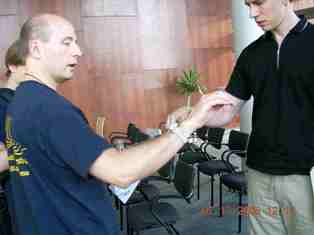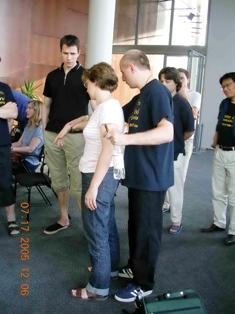
No Summer Vacation for Paavo
"You can actually touch the sound. Feel it with your hands,"
says Paavo Järvi, standing barefoot before a class of young conductors at the
Concert Hall in Pärnu, Estonia in July.

To illustrate, he reaches out,
draws his fingers together and pulls his hand back towards him.
The
gesture demonstrates how palpable music is to the Estonian born conductor, who
returns to Cincinnati this week to begin his fifth season as music director of
the Cincinnati Symphony Orchestra.
Järvi, 42, will lead the CSO in
Beethoven's Ninth Symphony at 8 p.m. Friday and Saturday at Music Hall.
Joining them will be soprano Camilla Tilling, mezzo-soprano Jane Gilbert, tenor
Stanford Olsen, bass Stephen Powell and the May Festival Chorus.
Järvi,
42, has been away from the CSO for four months, but it has been anything but a
vacation.
Since last season's final concert (May 7) he has conducted 25
concerts in eight countries on three continents.
They included St.
Petersburg, Russia, where he, his father Neeme and brother Kristjan all
conductors and sister, flutist Maarika Järvi, took part in a marathon "Järvi
Gala" June 25 for St. Petersburg's annual "White Nights" Festival.
He
was in Japan in May and June for concerts with Tokyo's NHK Symphony, and he
would have added even more miles to his itinerary if he had not spent an extra
week in Tokyo to be treated for a hand injury. As a result, he had to cancel
four performances with the Detroit Symphony in mid-June concluding its "Järvi
Fest" tribute to his father upon completion of 15 years as DSO music
director.
The Neeme Järvi Summer Academy a 10-day master course led by
his father in Pärnu was the closest Järvi came to a break in his relentless
schedule. For four days in July, he coached ten young conductors in rehearsals
and video sessions and helped prepare them for a concert with the St. Petersburg
Academic Philharmonic Orchestra. Each student conducted a movement of
Mendelssohn's Incidental Music to "A Midsummer Night's Dream" as part of
Pärnu's annual David Oistrakh Festival. Paavo himself conducted
Mozart's Violin Concerto No. 3 in G Major, with violinist Tatiana Berman as
the soloist.
A town of spas and Old World charm on the Baltic Sea, Pärnu
is Estonia's summer capital and a vacation spot for Scandinavia. It is also
where Järvi spent real vacations as a child. The Järvi family left Estonia in
1980, when Paavo was 17.
For two or three months each summer they lived
in a cottage Neeme built near the shores of the Baltic. The Järvis still visit
the spot where Paavo, Maarika and Kristjan romped through the woods, swam and
enjoyed the company of a close, extended family.
On this trip, Järvi
took Berman and their daughter Lea (now 19-months-old) to see where trees that
were once saplings now tower over the landscape.
The conducting students,
all professionals in their 20s and 30s, gave Järvi high marks as a
teacher.
Mihhail Gerts, resident conductor of the Estonian National Male
Choir, called him "the key to the whole thing for me," an "analyst" who can also
inspire.
Rachael Young, a native New Zealander now working in London,
also praised his analytical skills. "He's extremely articulate and very
generous with his time. He clarified technical issues in a creative and
imaginative way, not in a dry way. Everything was related to the music as
opposed to artificial examples."
She and Spanish born Roberto Veses, a
student at Helsinki's famed Sibelius Academy, made some fundamental changes at
Järvi's suggestion.
"I used to hold the baton in my left hand, but I
changed it overnight," said Young.

Unlike a left-handed pitcher, whose
goal is to defeat the opposing team, a conductor must score with the orchestra,
and "right-handed is what they're used to," she said. "Also, if you're
left-handed (the left hand conveys much of the expression in conducting) you
have a more expressive left hand as well."
Veses was persuaded to lay
down his baton entirely, at least for a while. In terms of expression, "he
(Paavo) said it would be easier to do what I wanted to do."
Järvi
himself seemed bemused by his teaching experience.
"I didn't think it
(conducting) was that hard," he said.
At the video session after the
concert, he critiqued each conductor's performance, apologized for his "brutal
honesty" and urged them to "take it in the right spirit. Nothing is meant to be
personal it's my point of view."
Gleaned from his
comments:
- "In Russia they would kill you for that kind of pizzicato (dull plucking). Give it character."
- "If you want the trumpet to play less, don't just hold up your hand and quit. Hold it up until he responds."
- "A conductor needs to look good. Find a comfortable position that isn't a distraction."
- "To give the music an edge, give the impression of moving ahead."
- "Sometimes looking 'maestoso' (majestic) will do the trick."
- "Use small gestures, no more than you need. The bigger you are, the slower you’re going to get."
- "The winds are rushing because their part moves faster than the choir. Prepare, breathe and be with them earlier. Figure out how to accommodate both."
- "Put your lederhosen on here."
- "In every Mendelssohn piece, there is a moment where you know he was Jewish."
- "This is not a serious movement ("Dance of Clowns"). Have fun with it."
- "This music is ridiculously well known ("Wedding March"). Just going one-two all the time won't do it."
- "During the march, look ahead to the fairy music. Begin to feel the motion."
In August he and the DK toured the U.S. and Canada. They played Beethoven at New York's Mostly Mozart Festival, selling out Alice Tully Hall. "Beethoven Strikes Back," wrote the New York Times, calling it "one hot performance." They also made a literally sweltering debut at Chicago's Ravinia Festival.
Järvi comes to Cincinnati right off the podium in Bonn, Germany where he led the DK Sunday (Sept. 11) in Beethoven's Fifth Symphony. He extended his contract with the DK through 2007 at a press conference in Bremen Aug. 24. He and the DK are recording the complete Beethoven symphonies for the Dutch label PentaTone and will tour Japan with the entire cycle in May, 2006.
Järvi becomes music director of the Frankfurt Radio Orchestra in September 2006, giving him a major presence on both sides of the Atlantic. In addition to the CSO, DK and Frankfurt Radio Orchestras, he is artistic advisor of the Estonian National Orchestra, with which he won a Grammy in 2004 for "Sibelius Cantatas" (Virgin Classics). Their just-released CD of Grieg's "Peer Gynt" (also Virgin Classics) is garnering high praise.
Järvi's CSO contract extends through the 2008-09 season.
Coincident with his return to Cincinnati, Telarc is releasing Järvi's latest CSO CD, an all-Czech album pairing Dvorak's "New World" Symphony and the Symphony No. 2 by Bohuslav Martinu. Järvi will sign copies at Music Hall opening weekend. It will be in record stores Sept. 27.
Scheduled for release later this season is a Telarc CD of the Concertos for Orchestra by Bartok and Witold Lutoslawski.
Artistically, the CSO is on a roll, with a highly successful tour of Europe last fall and consistent praise for its recordings. In what has been called a coup for the orchestra, the CSO has hired a new principal French hornist, John Zirbel, first horn of the Montreal Symphony (Zirbel was guest principal with the CSO for two Music Hall concerts in January and its Jan. 24 Carnegie Hall concert in New York). Also new is principal oboist Liang Wang, who comes to the CSO from the San Francisco Ballet and Santa Fe Opera Orchestras.
CSO patrons have a tasty season ahead of them, with Grieg's "Peer Gynt," Mahler's Symphony No. 2 ("Resurrection"), Elgar's "Enigma" Variations, Rachmaninoff's Symphony No. 2 and "Rhapsody on a Theme of Paganini" and a Gershwin-Bernstein evening with "Rhapsody in Blue" and "West Side Story" Symphonic Dances.
Guest artists include clarinetist Richard Stoltzman, pianists Garrick Ohlsson, Barry Douglas and Northern Kentucky's Anna Polusmiak, violinists Christian Tetzlaff and Akiko Suwanai and cellist Tanja Tetzlaff. The guest conductor list includes Xian Zhang (Sept. 30 and Oct. 1), Junichi Hirokami (Dec. 2 and 3), Sir Roger Norrington (Feb. 24 and 25), Jaime Laredo (Apr. 7 and 8), and William Eddins (Feb. 9 and 11).
CSO music director emeritus Jesus Lopez-Cobos returns October 14 and 15 with Bruckner's Symphony No. 8. Cincinnati Pops conductor Erich Kunzel leads a mostly Brahms concert honoring Kunzel's 40th anniversary with the CSO Oct. 7 and 8. Kunzel and the Pops will tour China and Singapore the end of October.
Järvi conducts two CSO weekends this visit, including Sept. 23 and 24 with Sibelius' Symphony No. 7, Swiss composer Arthur Honegger's Symphony No. 2 and Brahms' Violin Concerto with guest artist Leonidas Kavakos. He returns for three weekends in November, beginning with Beethoven's Symphony No. 1 and Mahler's Songs from "Des Knaben Wunderhorn" ("The Youth's Magic Horn") with guest baritone Matthias Goerne Nov. 4 and 5.
Telarc will make two recordings with Järvi and the CSO this season, Elgar's "Enigma" Variations paired with Benjamin Britten's "Young Person's Guide to the Orchestra" and Four Sea Interludes from "Peter Grimes" and an all-Rachmaninoff CD with his "Rock Fantasy" and Symphony No. 2.
Tickets to CSO concerts are $18.50-$76.75, $10 for students, half price for seniors. Call (513) 381-3300 or visit www.cincinnatisymphony.org.
(first published in The Cincinnati Post Sept. 12, 2005)